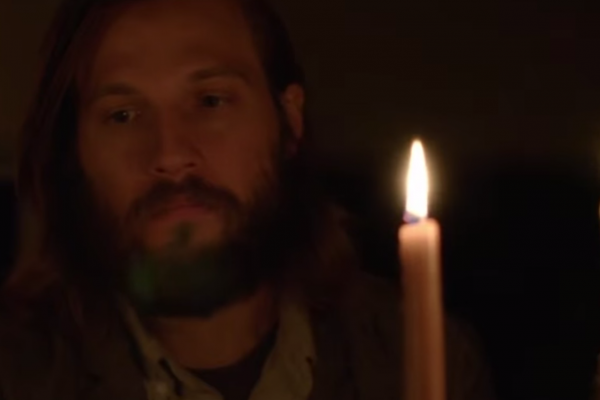At the beginning of director Karyn Kusama’s The Invitation, the protagonist, Will (Logan Marshall-Green), and his girlfriend Kira (Emayatzy Corinealdi) are on their way to a dinner party. On the road, they hit and wound a coyote. Rather than let the creature suffer, Will kills it with a tire iron. He gets back in the car, and continues driving.
The Invitation is a thriller, but it’s also a film about the ways people deal with pain. The coyote is a metaphor for the way Will addresses the trauma that has scarred his life: the death of his son, and subsequent failure of his marriage to his ex-wife, Eden (Tammy Blanchard). For Will, facing this pain is difficult, messy and unpleasant, but refusing to acknowledge it will only prolong the suffering.
Eden and her new husband David (Michiel Huisman) have taken a different approach. After two years of radio silence, the couple has invited Will, Kira, and a group of old friends to their home for an evening of catching up. Will is skeptical. Not long ago, Eden was suicidal with grief, but now is transformed, earthy and eerily serene. David’s calm, slightly patronizing demeanor also doesn’t sit right. The arrival of two strangers to the party (Lindsay Burdge and the supremely creepy John Carroll Lynch), who Eden and David claim to have met at a “retreat” in Mexico, is similarly unsettling.
The true purpose of the dinner party, and the reality behind Will’s suspicions, is a slow-burning, tense tale that works best the less the viewer knows going in. Suffice it to say that several characters come to the film with emotional baggage, and while Eden and David’s apparent bliss seems to have cured them of their problems, the source of that bliss — and its results — aren’t exactly as advertised.
The Invitation presents audiences with characters trying to move on from terrible experiences. It also presents two different ways of approaching the healing process, and the failing of a community to support those in pain.
Will is pragmatic, acknowledging that the pain of his son’s loss will never fully go away, and doing what it takes to move forward with his life. Eden attempts to seek out the quickest source of healing available. But it’s not true healing so much as denial in a fancy package, and with a heavy price tag.
Will and Eden are surrounded by a strikingly shallow group of friends, all of whom have been largely absent since their son’s death, and none of whom are able to fully relate to their emotions. In one way or another, each member of the group has either ignored their friends’ pain or kept their distance because of their own discomfort, which has only added to Eden’s desperation and Will’s alienation.
As Christians, we know the value of grief. Before resurrecting Lazarus, Jesus mourned with Mary and Martha. After his crucifixion, Christ’s disciples followed traditional burial rites, despite the danger inherent in doing so. Grieving is important, and understanding the long process of recovery is vital to that journey. But as humans, we want to avoid brokenness and unpleasantness as much as we can — either interacting with it, or expressing it ourselves. The Invitation reminds us that as long as pain, sin, and death exist, we will always be looking for quick fixes. But if we want to truly overcome trauma, the only way forward is through.
Got something to say about what you're reading? We value your feedback!

